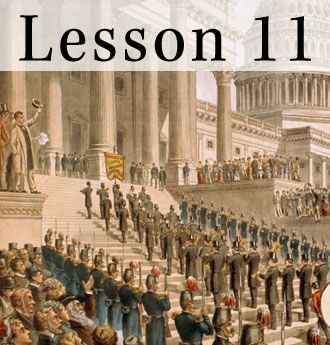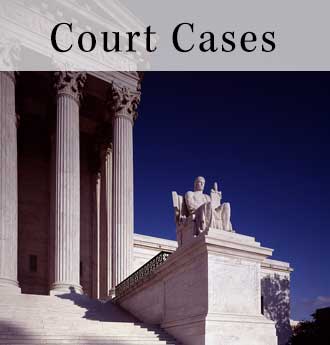Lesson 11: What Questions Did the Framers Consider in Designing the Three Branches of the National Government?
Morris, Gouverneur (1752-1816) Morris was born in New York to a wealthy family with a history of public service. Early in life, he lost a leg in a carriage accident. He graduated from King's College in New York City and studied law. Many of his family and friends were loyalists, but Morris sided with the patriots. He served in the militia as well as in the New York legislature and the Continental Congress. When he was defeated for Congress in 1779, Morris moved to Philadelphia to practice law. At the Philadelphia Convention, Morris gave more speeches than anyone else. He favored a strong national government ruled by the upper classes. He served on many committees and was the primary author of the actual document. After the convention, Morris spent ten years in Europe. He served briefly in the Senate, but then retired.
Washington, George (1732-1799) George Washington was born in Virginia in 1732. He grew up there on several plantations along the Potomac and Rappahannock Rivers. He was not particularly well educated, but did learn surveying. In 1753, he began his service to the country, which was to continue throughout his life, despite his desire to live a more private existence. Washington's efforts as commander of the Continental Army are well known. After the Treaty of Paris was signed in 1783, Washington returned to his home, Mount Vernon. Although he did not initially want to attend the Philadelphia Convention, his friends convinced him that his presence was necessary. He was elected president of the convention but spoke little. His presence and approval, however, were important. Nearly everyone assumed that Washington would be the first president of the United States, which, of course, he was, serving from 1789-1797.
Wilson, James (1741-1798) Wilson was born and educated in Scotland. He arrived in America in 1765, where he taught and studied law. He set up a legal practice in Pennsylvania. He was active in the revolutionary effort, voting for independence and signing the Declaration. After the war, he defended loyalists and their sympathizers. His shift to conservatism angered many people in Pennsylvania, but by the 1780s, Wilson was again elected to the Continental Congress. He was an influential delegate to the Philadelphia Convention, where he spoke even more often than Madison. Wilson led the ratification effort in Pennsylvania. In 1789, he was appointed to the Supreme Court.








